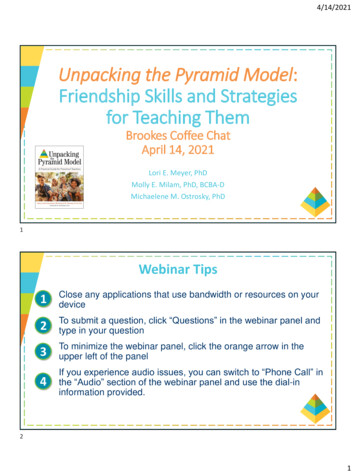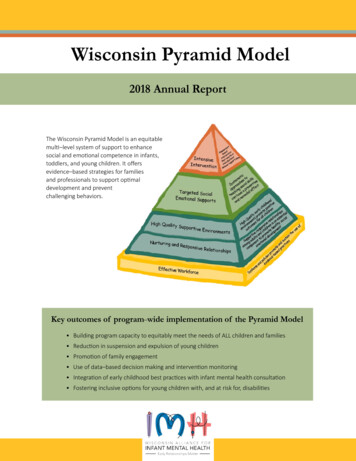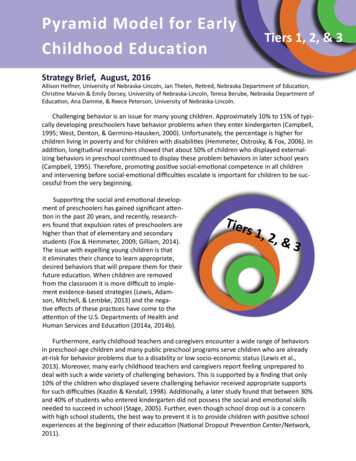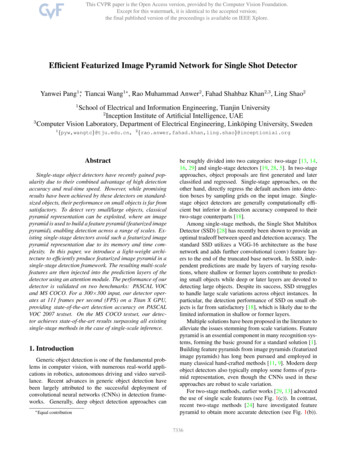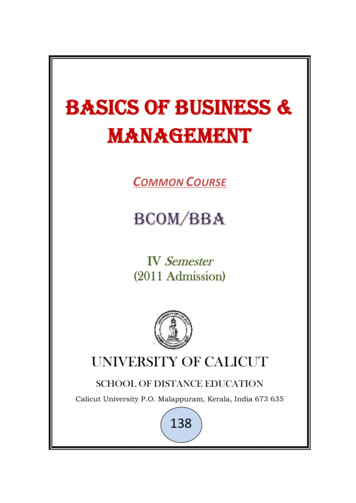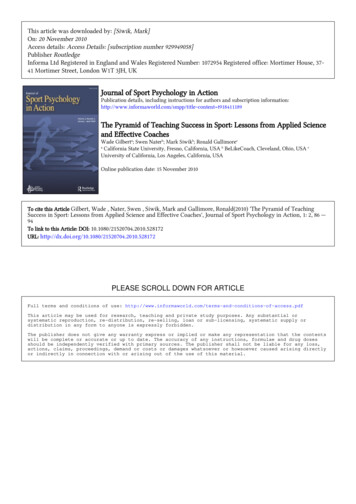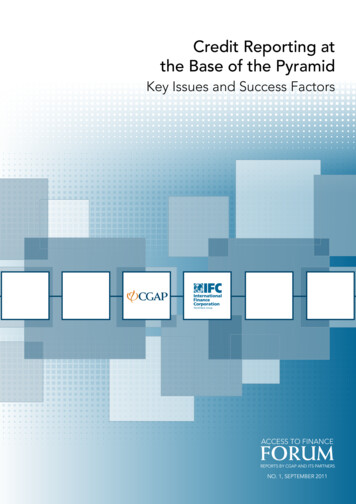
Transcription
Illinois Pyramid Model PartnershipPromoting Social Emotional Competence in Illinois’ Young ChildrenPortions Adapted from:Rob Corso, Pyramid ConsortiumMary Louise Hemmeter, Vanderbilt University
Our MissionSocial-emotional competence is foundational for learning and developingresilience in young children, and Illinois is committed to promoting andsupporting healthy social-emotional growth for all children ages birth to five.Our VisionIllinois envisions an integrated system of professional development with HeadStart, Childcare, and Public Schools in partnership with the Governor’s Officeof Early Childhood to provide training to all birth to five early childhoodpractitioners on the Center for the Social and Emotional Foundations for EarlyLearning (CSEFEL) conceptual framework and the Pyramid Model, utilizingimplementation science of the Teaching Pyramid Observation Tool (TPOT) toassess and obtain reliability, knowledge, skills, attitudes, and supportsnecessary to nurture all young children’s social-emotional development withintheir family, culture and community. The system will maximize collaboration toenhance linkages and methods for local agencies to deliver services and toconnect families to appropriate interventions to become competent in the socialemotional of all children ages birth to five in all environments.
Overview The Pyramid Model for Supporting Social-Emotional Competence in Infantsand Young Children is a conceptual framework of evidence-based practices. Research-based model developed by the federally-funded Center for Socialand Emotional Foundations for Early Learning (CSEFEL). Data from the first five years in various states indicates that it is a soundframework for early care and education systems. Builds on research from PBS/PBIS and implementation science. Illinois is the 31st state to implement the model statewide.
The Pyramid ModelChildren with PersistentChallengesChildren NeedingAdditional SupportAllChildren
Nurturing and ResponsiveRelationships Foundation of the pyramid Essential to healthy social development Includes relationships with children, families and teammembers
High Quality Environments Inclusive early care andeducation environments Comprehensive system ofcurriculum, assessment, andprogram evaluation Environmental design,instructional materials,scheduling, child guidance,and teacher interactions thatmeet high quality practices asdescribed by NAEYC andDEC6
Targeted Social EmotionalSupports Self-regulation, expressingand understanding emotions,problem solving, developingsocial relationships Explicit instruction Increased opportunities forinstruction, practice, feedback Family partnerships Progress monitoring anddata-based decision-making
Individualized IntensiveInterventions Comprehensiveinterventions across allsettings including homeand community Assessment-based Collaborative team Skill-building8
Pyramid Guiding PrinciplesSupporting young children’s social and emotional development to prevent challengingbehaviorsIndividualizing interventions to meet children’s and families unique interests, strengthsand needs.Promoting skill building with enough intensity to affect change.Implementing strategies in the context of naturally occurring routines and environmentsEnsuring consistency of use through a systematic process.Modifying strategies to meet the cultural and linguistic needs of families and children.
Formula for SuccessPyramid Model PracticesIntervention FidelityState and Program Systems forImplementation FidelityMeaningful OutcomesAdapted from Fixsen & Blase, 2012
Expected Outcomes in Illinois Improved staff confidence in supporting all children, includingthose with challenges.Enhancement of partnerships with families.Increase in overall classroom quality and improved retention ofearly educators across all program types and funding streams.More intentional teaching of social skills and emotionalcompetencies.Support for children with the most intensive behavioral needs.Provide early learning providers with tools to avoid the use ofsuspension and expulsion, aligned with Public Act 100-105:Illinois Early Childhood Expulsion Policy.
Preventing Expulsion in Illinois:BackgroundAdapted from “Webinar: Preventing Early Childhood Expulsion in Illinois” by Illinois Actionfor Children and the Ounce of Prevention Fund, September 19, 2017
Illinois Early Childhood ExpulsionPolicy The goal of PA 100-105 is to ensure early childhood programs engage in bestpractices in their disciplinary actions by prohibiting expulsions of young childrendue to child behavior The legislation is an opportunity to connect providers to existing availableresources and supports to address the various needs of children Federal policy statement from Departments of Education and Health & HumanServices on Suspension and expulsion suspension final.pdf Best practices for preventing expulsion align to the Pyramid Model:–––––Improved classroom environments and teacher interactionsImplementation of a tiered system of supports (universal, intervention, treatment)Training, support and professional development for staffInfant/Early Childhood Mental Health ConsultationFamily Engagement and PartnershipPortions Adapted from “Webinar: Preventing Early Childhood Expulsion in Illinois” byIllinois Action for Children and the Ounce of Prevention Fund, September 19, 2017
Illinois’ System ComponentsState LeadershipTeamState Coordinators; crossagency and cross-sector teamMaster CadreExternal coaches tosites; state T/TADemonstration SitesProgram Leadership Team: administrator,internal coach, data coordinator, othersImplementation SitesProgram Leadership Team: administrator,internal coach, data coordinator, others
What Makes it Work? Enthusiastic Leaders of Change Administrative support Ongoing support for those working directly with childrenand their families Clearly articulated policies and procedures related tobehavior Commitment to long term process - systems change Collaboration between EC, K-3 and mental health/behaviorconsultantsAnd Coaching!
Progress to DateIllinois convened a State Leadership Team in 2017 with stakeholdersrepresenting multiple sectors and agencies involved in Illinois’ early childhoodsystem. The goal of this team is to resolve state-level barriers and advanceinteragency collaboration at the state and local levels to provide resources andprofessional development to all early learning educators.Since convening this team, Illinois has also achieved the following milestones: Trained 50 practitioners as trainers in the Pyramid Model in May 2017, 25 tofidelity on the Teaching Pyramid Observation Tool. Developed a mission, vision, goals and outcomes for the Pyramid Model inIllinois. Partnered with the Pyramid Model Consortium as the 31st Pyramid Modelstate.
Pyramid Resources Center on the Social and Emotional Foundations for Early Learning (CSEFEL) –www.vanderbilt.edu/csefelNational Center for Pyramid Model Innovations –www.challengingbehavior.orgPyramid Model Consortium – www.pyramidmodel.orgThe Pyramid Equity Project: Promoting Social Emotional Competence andAddressing Disproportionate Discipline in Early Childhood Programs urces.htmResources from the Administration for Children & Families on ReducingSuspension and Expulsion Practices in Early Childhood Settings ree online Pyramid Model training modules –http://csefel.vanderbilt.edu/resources/training modules.html
Get InvolvedThe next steps for Illinois’ journey as a Pyramid Model state are to expand thecadre of trainers and develop a system for coaching and professionaldevelopment to ensure fidelity. There are a number of ways for programs andother stakeholders to become involved as demonstration or implementationsites, training partners or supporters.To learn more:VisitIllinois’ Governor’s Office of Early Childhood ages/default.aspxContactDonna NylanderProject Director, Illinois Pyramid ModelGov.pyramidmodel@illinois.gov
Learning (CSEFEL) conceptual framework and the Pyramid Model, utilizing implementation science of the Teaching Pyramid Observation Tool (TPOT) to assess and obtain reliability, knowledge, skills, attitudes, and supports necessary to nurture all young children's social-emotional development within their family, culture and community.
